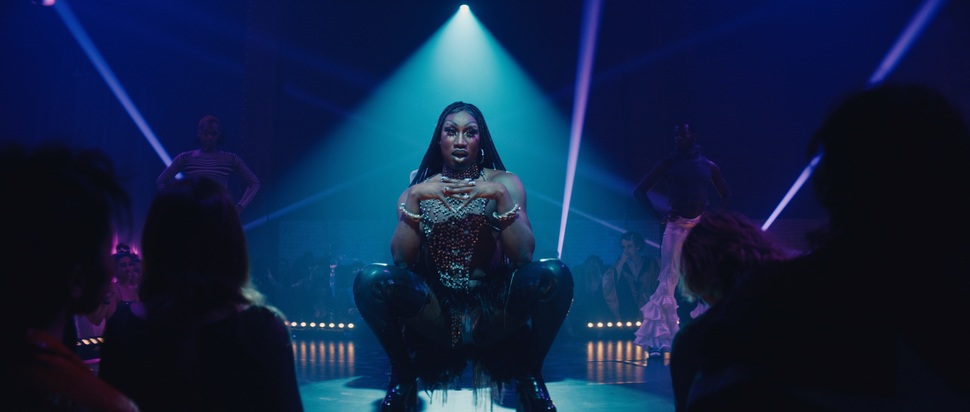Sam H Freeman and Ng Choon Ping on Femme
Directors Sam H Freeman and Ng Choon Ping explore myriad modes of masculinity in their bristling queer thriller Femme, which sees a drag artist out to exact revenge on a homophobic thug
In Femme, the electrifying London-set debut feature from Sam H Freeman and Ng Choon Ping, every character is playing a role. When we first meet Jules (Nathan Stewart-Jarrett), he’s onstage at a gay nightclub as his alter-ego, Aphrodite, a fierce drag queen who doesn’t take shit from anyone. Jules’ demeanour notably shifts when he ventures outside the confines of the club in his Aphrodite getup to buy some cigarettes, his glamour and confidence evaporating when he encounters a group of thuggish young men. After a tense exchange of words, the gang’s ringleader, Preston (George MacKay), proceeds to beat up Jules in a shocking homophobic attack.
What initially seems like a familiar queer drama dealing with LGBTQ+ trauma soon takes on Hitchcockian dimensions. It turns out Preston’s display of hyper-masculinity isn’t all that it seems. Jules spotted Preston eyeing him up outside the club earlier in the night, and suspects his macho demeanour is a disguise to conceal his closeted homosexuality, a theory that's confirmed a few months later when Jules encounters Preston, by chance, in a gay sauna. As he eyes his glistening body, Jules sets a plan in motion to exact his revenge by allowing himself to be picked up by his attacker. As the men continue to meet for sex, different modes of masculinity are worn and discarded like changes of outfits.
“That’s why drag was so important to us,” says Freeman when I chat with him and Ping over Zoom, “because we wanted to explore the performance of gender. In the beginning, Jules’ drag was simply a plot device. We were like, 'Oh, Preston won't be able to recognise him; that makes sense.' But then we came to realise that drag is the key word of the whole film. Whenever we were writing the characters, or even discussing the characters with the actors on set, we would always talk about ‘What is this character's drag?’”
This concept of gender transformation will feel familiar to many gay people. At some time in their life, they’ll likely have had to shift their identity in some way, whether consciously or unconsciously, as a form of defence. “Definitely,” agrees Freeman. “I've walked down streets and had to think about holding my boyfriend's hand, thinking, ‘What area are we in? Does it feel safe here?’ You often create stories based on the things that frighten you or things that preoccupy you, and I think that's definitely a big part of where this story comes from.”
For Ping, it was crucial that Jules’ performances of gender weren’t solely based on hiding. “What was important to us is that it’s an active thing,” he says. “That's what we hope is the unique offering of this film. It is not just about trauma, it is not just about hiding your true self to be saved from something, but it's about putting on a facade, or a drag, to infiltrate a different world – it's almost like Jules is going undercover.”
Freeman and Ping have been friends since 2015, and were flatmates for three of those years. It was during this flatshare that the idea of collaborating on a film first came up. “I was working as a screenwriter,” explains Freeman, “and Ping was working as a theatre director, so it felt like a film project would be the middle point for the two of us.”
The right idea wasn’t forthcoming initially, but while watching The Safdie Brothers' Good Time one night, inspiration struck. “The neo-noir genre is something that we really enjoy,” says Ping, “but we felt like, as queer people, we never saw ourselves represented in it. So the original aim was just to do a sort of queer inversion on the crime thriller.”
This isn’t the only genre they planned to put their stamp on though: they also wanted to subvert the well-worn trope of the LGBT drama. “Quite a lot of LGBTQ films are, you know, coming out films or assimilation dramas,” says Ping. “I guess we explore trauma and homophobia, but we wanted to dig deeper into that; it’s about how we feel about revenge and power and gender roles, whether as straight people or as queer people.”
There is no shortage of directing duos, although they tend to fall into two camps. There are the siblings (the Dardennes, the Wachowskis, the Coens or the aforementioned Safdies) and there are the couples (Anna Boden and Ryan Fleck, Straub–Huillet, Joe Lawlor and Christine Molloy). This makes sense. The level of trust and honesty required to collaborate on a project as gruelling as a feature film is enormous; it helps if you share blood or a bed. Freeman and Ping are the rare case of co-directors who are neither related nor romantically entangled, but their collaboration seems to have run smoothly.
“I think what really worked for us was that, because there were two of us, it meant that before anything could happen, we had to talk to each other extensively and rigorously and question every single thing, to the point that by the time we got to execute the vision, the vision was pretty much shared between us,” explains Ping. "It was interesting hearing other people on set speak about how we worked together. They said that it was kind of like there was just one person doing directing, because there was no friction or obstacles. You hear about people fighting on set, but that totally didn't happen.” He pauses before laughing. “We did all our fights off set.”
Femme is in UK cinemas from 1 Dec via Signature Entertainment; the film had its UK premiere at Edinburgh International Film Festival, Everyman Cinema 20 Aug & Vue Omni Centre, 21 Aug, in partnership with The Skinny
